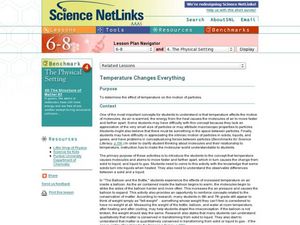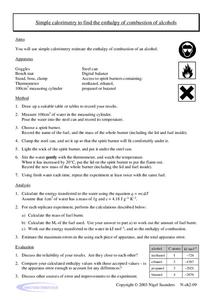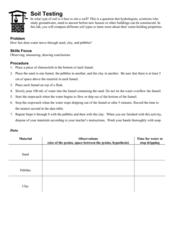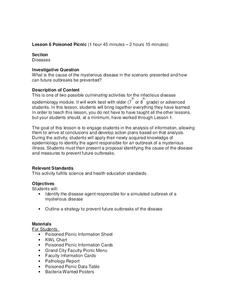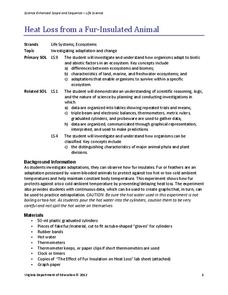Curated OER
Volume Lab
How can we find volume if it a shape isn't easy to measure? Investigate methods for determining this as the volume of regular and irregular objects is explored in several stations. Learners discover that when the standard formula for...
Curated OER
Temperature Changes Everything
Middle school chemists visit interactive websites in order to discover what happens to molecular motion when heat is added to matter. They conduct an experiment that demonstrates the expansion of matter with the addition of heat. A lab...
Creative Chemistry
Displacement Reactions of the Halogens
During this lab activity, chemists discover the reactivities of chlorine, bromine, and iodine as examples of the halogens. They use a displacement reaction as a test by adding other compounds and observing for a color change. The lab...
Creative Chemistry
Simple Calorimetry to Find the Enthalpy of Combustion of Alcohols
Accomplished chemistry learners set up a calorimeter and measured the energy released by various alcohols: methanol, ethanol, and either propanol or butanol. Lab masters will first need to design their tables for recording data. Consider...
PHET
Planet Designer: What’s Trending Hot?
Excite scholars to design their own planet in this first of five lessons. The lesson starts with a pre-activity assessment, a complete lesson plan that is easy to implement, and a post-activity assessment that would look great...
PHET
Planet Designer: Martian Makeover
Mars used to have liquid water, can you make it come back? Use the lesson and simulation to understand why Mars lost its magnetic field, why atmosphere is important, and what gravity has to do with it. This is the third lesson...
Curated OER
Soil Testing
Earth science learners experiment with the water-holding properties of sand, pebbles, and clay. They apply their findings to the building of a well. This activity is engaging and tactile, and it demonstrates the importance of considering...
Curated OER
Round and Round
Learners interpret data from a three-dimensional array of current monitors to determine an overall pattern of water circulation. They hypothesize what effect an observed water circulation pattern might have on seamount fauna. A very...
Curated OER
Periodic Behavior of Oxides
High schoolers investigate the properties of oxides and observe their periodic trends. In this behavior of oxides lesson plan, students experiment with metallic oxides and non-metallic oxides to determine if they are acid, basic or...
American Chemical Society
Using the Combining Test to Identify Unknown Liquids
Once investigators have learned how their mystery liquids interact with water during the preceding activity, they now use their observations to identify them. This is an ideal conclusion to the mini unit on the properties of water.
Curated OER
Review of Ionic and Covalent Compounds and Transitioning from Ionic to Covalent Compounds
Here is a unique assigment: compare and contrast ionic and covalent compounds in an extensive data table and then analyze Lewis dot structures in antoher. Three columns are to befilled in: "characteristic or feature," "applies to ionic...
Serendip
Is Yeast Alive?
Through two investigations, life science learners determine whether or not yeast is alive. They perform tests for metabolism by providing sugar and observing if gas is produced as a byproduct. They incubate some of the sample for at...
Curated OER
Solar Kit Lesson #7 - Positioning Solar Panels I: Explorations with Tracking
In this first part of a two-part lesson, learners track and record the sun's azimuth using a solar panel. They graph and analyze the data to identify relationships among the time of day, the altitude and azimuth of the sun, and the...
Centers for Disease Control and Prevention
Poisoned Picnic
A group of teachers attended a picnic; ten became sick and another four died. Young scholars must solve the mystery of what happened. They research the river, waste water treatment plant, each food that was served, and environmental...
Curated OER
Grow an Alum Crystal
What an exciting lab experiment to conduct with your high school chemistry class! Crystals are formed naturally in the environment. However, allow your blossoming chemists to create their own unique crystals using alum and...
Curated OER
Finding Ocean Depth
How to oceanographers measure the sea's depth? Your scientists will step into their shoes in this application learning exercise, first reading about how the speed of sound and a simple formula give scientists a depth estimation. Learners...
NOAA
Ground-truthing Satellite Imagery with Drifting Buoy Data
Ground-truthing ... is it even a word? The last installment of a five-part series analyzes how scientists collect sea surface temperature data. Scholars use government websites to compare temperature data collected directly from buoys...
Virginia Department of Education
Heat Loss from a Fur-Insulated Animal
How do animals adapt to weather changes? Provide your class with the ability to understand adaptations and body temperature as they participate in this hands on experiment, using fake fur and hot water. Pupils collect data and...
NASA
Christa's Lost Lesson: Effervescence
How are chemical reactions affected by gravity? Learners explore the phenomenon of effervescence as part of the Christa's Lost Lessons series. They compare findings in an experiment on effervescence to a video of a similar experiment in...
Science Geek
Element Classes
Introduce your young chemists to alkali metals, alkali earth metals, transition metals, metalloids, nonmetals, halogens, and noble gasses with a presentation that explains the classes of elements and a few facts about each.
Curated OER
Do Some Research
In this Internet research worksheet, students conduct library or Internet research on the water table then draw a picture and write a report on the topic.
Curated OER
Water Flow Through Local Soils
Students examine the relationship between particle size and rate of water flow through soil. They collect soil samples, make predictions, conduct a water flow experiment, analyze the data, and answer conclusion questions.
Curated OER
Water World
Students explore the various steps of the water cycle. They identify the three steps in the water cycle and how they are related. Students describe three ways to conserve water. Students explore the origin of the water source that...
Curated OER
Water-Is There Going to be Enough?
Students research the availability, usage and demand for water in the local area historically and use projections of the availability, usage and demand for water up to the year 2050. They gather data and present the information in...

